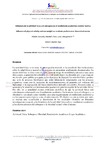Mostrar o rexistro simple do ítem
Influencia de la actividad física y el sobrepeso en el rendimiento académico: revisión teórica
| dc.contributor.author | Abalde-Amoedo, Natalia | |
| dc.contributor.author | Pino-Juste, Margarita | |
| dc.date.accessioned | 2016-12-05T09:16:40Z | |
| dc.date.available | 2016-12-05T09:16:40Z | |
| dc.date.issued | 2016 | |
| dc.identifier.citation | Sportis, 2016, 2 (1): 147-161 ISSN: 2386-8333 | |
| dc.identifier.issn | 2386-8333 | |
| dc.identifier.uri | http://hdl.handle.net/2183/17704 | |
| dc.description.abstract | [Resumen] La actividad física es un tema de preocupación mundial en la actualidad. Sus implicaciones sobre la salud física y mental de las personas se encuentran ampliamente documentados. La inactividad física se sitúa como el cuarto factor de riesgo de mortalidad y además es una causa directa para la aparición del sobrepeso y, en un grado mayor, la obesidad, por lo que requiere un elevado gasto público por parte de los Servicios de Sanidad. La actividad física produce una serie de procesos fisiológicos que están íntimamente relacionados con los procesos cognitivos, como son la secreción de neurotransmisores, el aumento del volumen del hipocampo o la segregación del factor neurotrófico derivado del cerebro. Procesos como la memoria y la atención son incrementados gracias a la práctica regular de la actividad física. Por ello, en la actualidad existen evidencias científicas de que la actividad física está estrechamente relacionada con el rendimiento académico. En la misma línea, el sobrepeso y la obesidad se han alzado como variables asociadas negativamente al rendimiento académico y ciertos aspectos psicológicos, como el auto-concepto. El objetivo de esta revisión, por tanto, es realizar una recopilación y descripción de los resultados obtenidos en diferentes investigaciones respecto a los beneficios de la actividad física sobre el rendimiento académico y los efectos adversos del sobrepeso o la obesidad infantil sobre el mismo. | |
| dc.description.abstract | [Abstract] Physical activity is an issue of global concern today. Its implications on people’s physical and mental health are highly documented. Physical inactivity is ranked as the fourth leading risk factor for global mortality and also is a direct cause of overweight and, at a higher extent, of obesity, so it leads to higher public costs by Health Systems. Physical activity produces a series of physiological processes that are highly related with cognitive processes, such as brain-derived neurotrophic factor segregation. Processes such as memory and attention are increased by regular physical activity. Therefore, there exist scientific evidence for the relationship between physical activity and academic performance. Furthermore, both overweight and obesity have raised as variables negatively associated to academic performance and some psychological aspects, such as self-concept. The objective of this review , therefore, is to make a compilation and description of the results of various investigations regarding the benefits of physical activity on academic performance and adverse effects of childhood overweight and obesity on it too. | |
| dc.language.iso | spa | |
| dc.publisher | Universidade da Coruña | |
| dc.relation.uri | http://dx.doi.org/10.17979/sportis.2016.2.1.1446 | |
| dc.subject | Actividad física | |
| dc.subject | Sobrepeso | |
| dc.subject | Obesidad | |
| dc.subject | Rendimiento académico | |
| dc.subject | Logro académico | |
| dc.subject | Physical activity | |
| dc.subject | Overweight | |
| dc.subject | Obesity | |
| dc.subject | Academic performance | |
| dc.subject | Academic achievement | |
| dc.title | Influencia de la actividad física y el sobrepeso en el rendimiento académico: revisión teórica | |
| dc.title.alternative | Influence of physical activity and overweight on academic performance: theoretical review | |
| dc.type | info:eu-repo/semantics/article | |
| dc.rights.access | info:eu-repo/semantics/openAccess | |
| UDC.journalTitle | Sportis | |
| UDC.volume | 2 | |
| UDC.issue | 1 | |
| UDC.startPage | 147 | |
| UDC.endPage | 161 |






